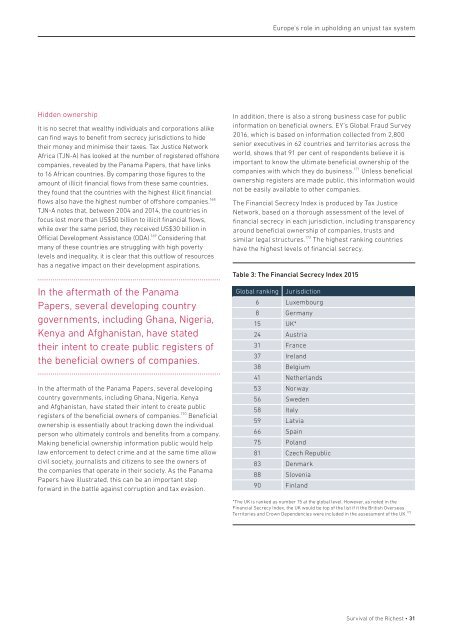Create successful ePaper yourself
Turn your PDF publications into a flip-book with our unique Google optimized e-Paper software.
Europe's role in upholding an unjust tax system<br />
Hidden ownership<br />
It is no secret that wealthy individuals and corporations alike<br />
can find ways to benefit from secrecy jurisdictions to hide<br />
<strong>the</strong>ir money and minimise <strong>the</strong>ir taxes. Tax Justice Network<br />
Africa (TJN-A) has looked at <strong>the</strong> number <strong>of</strong> registered <strong>of</strong>fshore<br />
companies, revealed by <strong>the</strong> Panama Papers, that have links<br />
to 16 African countries. By comparing those figures to <strong>the</strong><br />
amount <strong>of</strong> illicit financial flows from <strong>the</strong>se same countries,<br />
<strong>the</strong>y found that <strong>the</strong> countries with <strong>the</strong> highest illicit financial<br />
flows also have <strong>the</strong> highest number <strong>of</strong> <strong>of</strong>fshore companies. 168<br />
TJN-A notes that, between 2004 and 2014, <strong>the</strong> countries in<br />
focus lost more than US$50 billion to illicit financial flows,<br />
while over <strong>the</strong> same period, <strong>the</strong>y received US$30 billion in<br />
Official Development Assistance (ODA). 169 Considering that<br />
many <strong>of</strong> <strong>the</strong>se countries are struggling with high poverty<br />
levels and inequality, it is clear that this outflow <strong>of</strong> resources<br />
has a negative impact on <strong>the</strong>ir development aspirations.<br />
In <strong>the</strong> aftermath <strong>of</strong> <strong>the</strong> Panama<br />
Papers, several developing country<br />
governments, including Ghana, Nigeria,<br />
Kenya and Afghanistan, have stated<br />
<strong>the</strong>ir intent to create public registers <strong>of</strong><br />
<strong>the</strong> beneficial owners <strong>of</strong> companies.<br />
In <strong>the</strong> aftermath <strong>of</strong> <strong>the</strong> Panama Papers, several developing<br />
country governments, including Ghana, Nigeria, Kenya<br />
and Afghanistan, have stated <strong>the</strong>ir intent to create public<br />
registers <strong>of</strong> <strong>the</strong> beneficial owners <strong>of</strong> companies. 170 Beneficial<br />
ownership is essentially about tracking down <strong>the</strong> individual<br />
person who ultimately controls and benefits from a company.<br />
Making beneficial ownership information public would help<br />
law enforcement to detect crime and at <strong>the</strong> same time allow<br />
civil society, journalists and citizens to see <strong>the</strong> owners <strong>of</strong><br />
<strong>the</strong> companies that operate in <strong>the</strong>ir society. As <strong>the</strong> Panama<br />
Papers have illustrated, this can be an important step<br />
forward in <strong>the</strong> battle against corruption and tax evasion.<br />
In addition, <strong>the</strong>re is also a strong business case for public<br />
information on beneficial owners. EY’s Global Fraud Survey<br />
2016, which is based on information collected from 2,800<br />
senior executives in 62 countries and territories across <strong>the</strong><br />
world, shows that 91 per cent <strong>of</strong> respondents believe it is<br />
important to know <strong>the</strong> ultimate beneficial ownership <strong>of</strong> <strong>the</strong><br />
companies with which <strong>the</strong>y do business. 171 Unless beneficial<br />
ownership registers are made public, this information would<br />
not be easily available to o<strong>the</strong>r companies.<br />
The Financial Secrecy Index is produced by Tax Justice<br />
Network, based on a thorough assessment <strong>of</strong> <strong>the</strong> level <strong>of</strong><br />
financial secrecy in each jurisdiction, including transparency<br />
around beneficial ownership <strong>of</strong> companies, trusts and<br />
similar legal structures. 172 The highest ranking countries<br />
have <strong>the</strong> highest levels <strong>of</strong> financial secrecy.<br />
Table 3: The Financial Secrecy Index 2015<br />
Global ranking<br />
Jurisdiction<br />
6 Luxembourg<br />
8 Germany<br />
15 UK*<br />
24 Austria<br />
31 France<br />
37 Ireland<br />
38 Belgium<br />
41 Ne<strong>the</strong>rlands<br />
53 Norway<br />
56 Sweden<br />
58 Italy<br />
59 Latvia<br />
66 Spain<br />
75 Poland<br />
81 Czech Republic<br />
83 Denmark<br />
88 Slovenia<br />
90 Finland<br />
*The UK is ranked as number 15 at <strong>the</strong> global level. However, as noted in <strong>the</strong><br />
Financial Secrecy Index, <strong>the</strong> UK would be top <strong>of</strong> <strong>the</strong> list if it <strong>the</strong> British Overseas<br />
Territories and Crown Dependencies were included in <strong>the</strong> assessment <strong>of</strong> <strong>the</strong> UK. 173<br />
<strong>Survival</strong> <strong>of</strong> <strong>the</strong> <strong>Richest</strong> • 31


